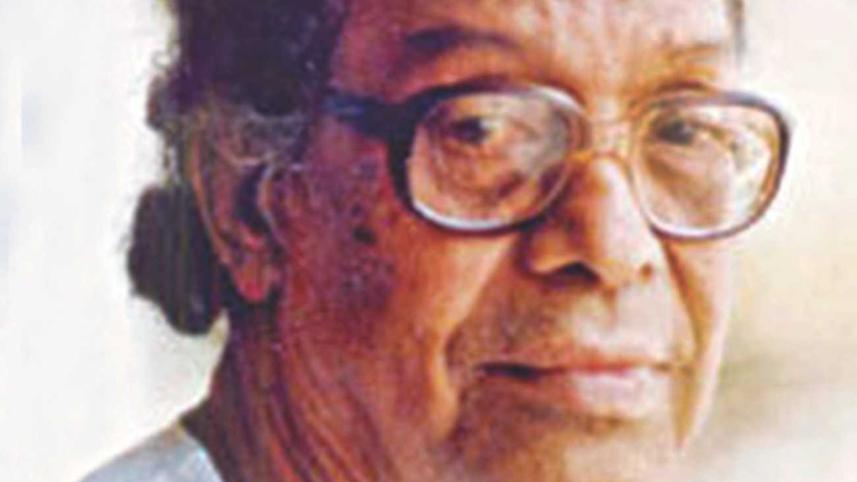Remembering a towering scholar

DR. Ahmed Sharif was a misunderstood personality in the socio-cultural life of our time. He was a towering scholar, researcher of Bangla literature and a forerunner of free thought movements in Bangladesh. A man with a deep sense of dignity who was a true non¬conformist, a former chairman and professor of the Bangla Department, University of Dhaka, Dr. Ahmed Sharif's life can be divided into two broad lines - his literary and intellectual side, and his socio-cultural and philosophical side.
Dr. Ahmed Sharif, who hailed from Patiya, Chittagong, obtained his Masters in Bangla Literature from Dhaka University in 1933, and Ph.D. degree in the same subject in 1967. From 1945 to 1949, he taught at Laksham Nawab Faizunnessa College and later at Feni College. In 1950, he joined as Research Assistant in the Bangla Department, University of Dhaka and retired as Chairman and Professor in 1983. During his teaching life in the university, he was elected as a member of the university senate, as well as member for the university syndicate, alongside being nominated as the president of the Teachers Association, and the University Teachers Club. Till date, Dr. Sharif is the only person to be elected as the Dean of the Faculty of Arts for three consecutive terms. After his retirement from the Dhaka University, he was offered the opportunity to join the University of Chittagong as the first "Kazi Nazrul Islam Professor", where he served for two years from 1984 to 1986.
He was the recipient of many honours and awards for his outstanding contributions in the field of medieval Bangla literature and contemporary socio-cultural-political essay. Amongst his several awards, the most notable are the BangIa Academy Literary Award in 1968, the Bangladesh Women Writers Association Literary Award in 1980, the Alakta Literary Council Award in 1989, and the Ekushe Padak in 1991. A major recognition carne from the Rabindra Bharati University in India, which conferred upon him the Doctor of Literature in 1995 for his outstanding contribution to Bangla literature. Apart from this, he was associated with 37 different progressive and left-oriented socio-cultural and intellectual organisations.
In his lifetime, he was the lone authority on ancient and medieval Bangla literature, the discussions of which he enriched with many original contributions. He was the author of more than 100-research publications on history, philosophy, and socio-cultural and contemporary political issues. He single handedly edited 46 manuscripts of ancient and medieval Bangla literature, while a number of others were in joint collaboration. Two volumes of his Bangali O Bangla Sahitya (Bengali and Literature of Bengal), published between 1978 to 1983, are considered to be masterpieces by sub-continental scholars. It may be mentioned here that during his lifetime he wrote more than 34,611 pages while his handwritten pages stand at 13,844 pages in print. However, he never cared much for publicity or appreciation of his massive scholarly works. During his lifetime, a large section of the so-called liberal democrats and secular intellectuals of the country continuously denied his scholarly contribution and attempted to suppress his free thoughts. In fact, even after his death, they continue to do the same till date but no one has ever questioned his intellectual honesty.
However, many believe that one of his major 'achievements' was that he, unlike many of his contemporary scholars and academicians, had been able to extract the hatred and enmity of reactionary forces through the bold expression of his views and ideals. The late scholar was universally regarded for his ability to say "no" to various material temptations. His dignity and self respect never permitted him to be submissive to power. Among his Dhaka University colleagues, he was just an impractical man, a cynic seized with radical ideas who was never "clever" enough to work for his own mundane interests, as he never took any undue advantage of his scholarship position and influence to become wealthy, famous and powerful. The educated but often ignorant people of Bangladesh are not aware of this misunderstood person who played a vital role to provoke our ideas to make us conscious of our conscience.
The writer is Professor and Chairman, Department of Sociology, University of Dhaka.
E-mail: nehal.karim@yahoo.com




 For all latest news, follow The Daily Star's Google News channel.
For all latest news, follow The Daily Star's Google News channel.
Comments